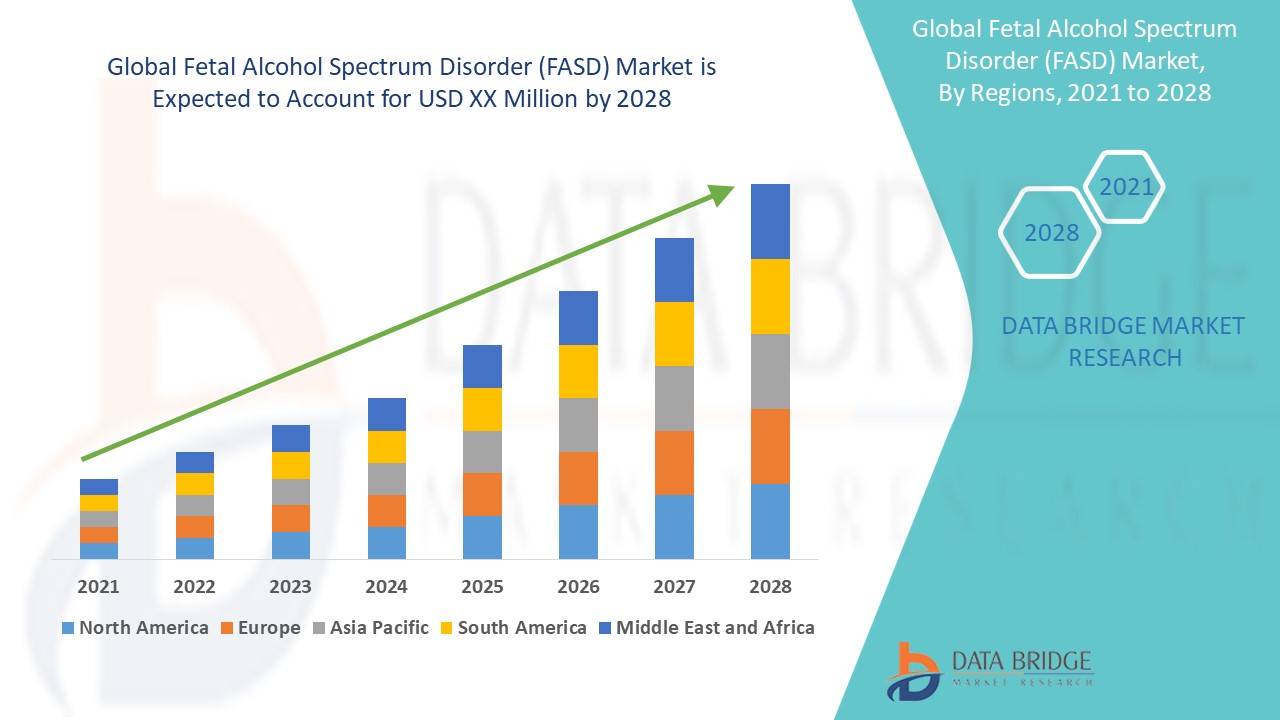胎児性アルコールスペクトラム障害(FASD)の世界市場規模、シェア、トレンド分析レポート
Market Size in USD Billion
CAGR :
% 
 USD
213.31 Million
USD
353.03 Million
2024
2032
USD
213.31 Million
USD
353.03 Million
2024
2032
| 2025 –2032 | |
| USD 213.31 Million | |
| USD 353.03 Million | |
|
|
|
|
世界の胎児性アルコールスペクトラム障害(FASD)市場:疾患の種類(胎児性アルコール症候群(FAS)、アルコール関連神経発達障害(ARND)、アルコール関連先天性欠損症(ARBD))、治療の種類(薬物療法、行動療法、教育療法)、エンドユーザー(病院、クリニックなど)、流通チャネル(直接販売と小売)別 - 業界動向と2032年までの予測
胎児性アルコールスペクトラム障害(FASD)市場分析
FASD市場における近年の進歩には、高度な診断ツールと治療介入の開発が含まれます。機能的MRIや拡散テンソル画像法といった神経画像技術といった新たな手法は、FASDに関連する微細な脳異常を特定することで、早期診断の精度を向上させています。また、血液や唾液中の特定の代謝物を測定するバイオマーカーに基づく診断も、非侵襲的かつ早期発見の手段として注目を集めています。
モバイルヘルスアプリなどの技術革新は、FASDの症状のモニタリングと管理にますます活用され、親や介護者にリアルタイムのサポートを提供しています。これらのアプリには、認知行動療法や行動追跡機能が組み込まれていることが多く、治療成果の向上に役立っています。
治療においては、FASDに伴う認知・行動面の課題に対処するため、ニューロフィードバックと経頭蓋磁気刺激法の進歩が研究されています。これらの方法は、発達遅延を軽減するための的を絞ったアプローチを提供します。
疾患に対する意識の高まりと研究資金の増加により、市場は成長を続けています。遠隔医療プラットフォームの統合により、診断・治療サービスへのアクセスが確保され、普及が促進され、世界的な市場成長が促進されます。
胎児性アルコールスペクトラム障害(FASD)市場規模
世界の胎児性アルコール症候群(FASD)市場規模は、2024年に2億1,331万米ドルと評価され、2025年から2032年の予測期間中に6.50%のCAGRで成長し、2032年には3億5,303万米ドルに達すると予測されています。市場価値、成長率、セグメンテーション、地理的範囲、主要プレーヤーなどの市場シナリオに関する洞察に加えて、データブリッジ市場調査がまとめた市場レポートには、専門家による詳細な分析、患者の疫学、パイプライン分析、価格分析、規制の枠組みも含まれています。
胎児性アルコールスペクトラム障害(FASD)市場動向
「早期診断と介入プログラムへの重点化」
胎児性アルコール症候群(FASD)市場の成長を牽引する重要なトレンドの一つは、早期診断と介入プログラムへの関心の高まりです。政府や医療機関は、FASDの予防可能性と長期的な影響について国民を啓蒙するための啓発キャンペーンを強化しています。例えば、CDCの「Think Before You Drink(飲酒前に考えよう)」イニシアチブは、妊娠中のアルコール摂取のリスクを強調しています。さらに、神経画像検査や遺伝子検査といった診断ツールの進歩により、FASDのより早期かつ正確な検出が可能になっています。FASDと診断された小児に対する行動療法などの早期介入プログラムは注目を集めており、患者の転帰を改善し、この市場における専門的な治療やサービスへの需要を拡大しています。
レポートの範囲と胎児性アルコールスペクトラム障害(FASD)市場セグメンテーション
|
属性 |
胎児性アルコールスペクトラム障害(FASD)の主要市場分析 |
|
対象セグメント |
|
|
対象国 |
北米では米国、カナダ、メキシコ、ヨーロッパではドイツ、フランス、英国、オランダ、スイス、ベルギー、ロシア、イタリア、スペイン、トルコ、ヨーロッパではその他のヨーロッパ、中国、日本、インド、韓国、シンガポール、マレーシア、オーストラリア、タイ、インドネシア、フィリピン、アジア太平洋地域 (APAC) ではその他のアジア太平洋地域、サウジアラビア、UAE、南アフリカ、エジプト、イスラエル、中東およびアフリカ (MEA) の一部としてその他の中東およびアフリカ (MEA)、南米の一部としてブラジル、アルゼンチン、その他の南米 |
|
主要な市場プレーヤー |
Novo Nordisk A/S(デンマーク)、Sanofi(フランス)、Pfizer Inc.(米国)、Momenta Pharmaceuticals(米国)、LEO Pharma A/S(デンマーク)、Igenomix(スペイン)、Laboratoire français de Fractionnement et de Biotechnologies(フランス)、Natera, Inc.(米国)、Perrigo Company plc(アイルランド)、Bayer AG(ドイツ)、Eli Lilly and Company(米国) |
|
市場機会 |
|
|
付加価値データ情報セット |
Data Bridge Market Research がまとめた市場レポートには、市場価値、成長率、セグメンテーション、地理的範囲、主要プレーヤーなどの市場シナリオに関する洞察に加えて、専門家による詳細な分析、患者の疫学、パイプライン分析、価格分析、規制の枠組みも含まれています。 |
胎児性アルコールスペクトラム障害(FASD)市場定義
胎児性アルコールスペクトラム障害(FASD)は、胎児期のアルコール曝露によって引き起こされる一連の疾患です。アルコールは胎児の成長と脳機能を阻害するため、身体的、行動的、認知的発達に影響を及ぼします。FASDには、顔面異常、発育不全、学習障害や注意欠陥など、様々な症状が含まれます。衝動性や社会的な交流の困難といった行動面の問題もよく見られます。重症度は、妊娠中のアルコール曝露の時期と量によって異なります。FASDは生涯にわたる疾患であり、治療法はありませんが、早期診断と治療や教育的支援などの介入により、転帰と生活の質を向上させることができます。
胎児性アルコールスペクトラム障害(FASD)市場の動向
ドライバー
- 妊娠中のアルコール摂取の増加
妊娠中のアルコール摂取は、認知度が高まっているにもかかわらず、世界中で依然として大きな懸念事項であり、胎児性アルコール症候群(FASD)の早期診断と管理の需要を高めています。世界保健機関(WHO)によると、世界中の妊婦の約10%が飲酒を報告しており、ヨーロッパなどの特定の地域ではその割合が高くなっています。この蔓延はFASD症例の増加に寄与しており、医療制度は高度な診断ツールと早期介入プログラムの導入を迫られています。例えば、米国では、疾病予防管理センター(CDC)がFASDの啓発・支援プログラムを優先し、専門的な医療サービスの必要性を強調しています。これがFASD関連の診断・治療の市場成長を牽引しています。
- 遠隔医療の統合
遠隔医療の導入は、アクセスとケアの向上により、胎児性アルコール症候群(FASD)市場を大きく押し上げます。遠隔医療プラットフォームは、特に医療サービスが行き届いていない地域において、FASD患者への遠隔診療、早期評価、継続的なモニタリングを可能にします。例えば、カナダ北部のコミュニティでは、遠隔医療の活用により、FASDに罹患する子どもたちの診断および介入サービスへのアクセスが向上しました。さらに、遠隔医療は神経科医や行動療法士などの専門家間の連携を促進し、包括的なケアを保証します。これらの進歩は地理的障壁を軽減し、タイムリーな介入を促進することで、FASD管理における遠隔医療ソリューションの導入を促進します。結果として、遠隔医療は世界的な市場浸透と成長を促進します。
機会
- 診断ツールの進歩
神経画像診断や遺伝子検査といった高度な診断ツールの開発は、胎児性アルコールスペクトラム障害(FASD)市場において大きなビジネスチャンスを生み出しています。機能的MRIなどの神経画像診断技術は、胎児期のアルコール曝露による脳の構造的・機能的変化をより明確に理解することを可能にし、診断精度を向上させます。さらに、遺伝子検査はFASDに関連するバイオマーカーの特定に役立ち、早期発見を可能にします。例えば、「アルコール依存症:臨床および実験研究」誌に掲載された研究では、 FASDを患う小児の脳異常の検出におけるMRIの活用が強調されています。これらの進歩は、より正確で早期の診断を促進し、早期介入につながり、市場における診断製品およびサービスの需要の高まりを生み出しています。
- FASD患者における精神疾患の発生率の上昇
胎児性アルコールスペクトラム障害(FASD)患者におけるADHDや学習障害などの精神疾患への認知度の高まりは、市場に大きなビジネスチャンスを生み出しています。これらの疾患はFASDと併存することが多いため、FASDの神経学的側面と心理的側面の両方に対応する統合ケアソリューションへのニーズが高まっています。例えば、FASDと診断された子どもたちは行動上の問題を抱えることが多く、薬物療法と行動療法を組み合わせた治療が必要となります。包括的で学際的なケアサービスへの需要は、専門クリニック、治療プログラム、そして標的を絞った介入の開発を促し、新たな治療法や診断ツールの市場を創出しています。
制約/課題
- 高額な治療費
高額な治療費は、胎児性アルコール症候群(FASD)市場における大きな障壁となっています。早期介入、行動療法、長期サポートといった専門的なケアは、法外な費用がかかる場合があり、多くの人にとってアクセスが制限されています。これらの治療に伴う高額な経済的負担は、特に低所得世帯において、不十分なケアや遅延ケアにつながることがよくあります。さらに、多くの地域でFASD関連の治療が保険適用外であることも問題を悪化させ、市場全体の需要を減少させています。結果として、包括的な治療オプションの費用負担とアクセスの制限がFASD市場の成長を阻害し、患者へのサポート提供に大きなギャップが生じています。
- 限られた治療選択肢
胎児性アルコール症候群(FASD)の治療選択肢の不足は、市場の成長を著しく阻害しています。FASD治療に特化したFDA承認薬はなく、既存の治療法は主に症状の緩和に焦点を当てており、疾患の根本原因への対処には至っていません。こうした標的治療選択肢の不足は、FASD患者のための包括的なケアパスウェイの開発を阻害し、効果的な医療介入のための市場ギャップを生み出しています。さらに、薬理学的解決策の欠如は、製薬会社がFASD市場に参入し、事業を拡大する機会を制限し、この分野への投資とイノベーションを阻害しています。その結果、市場は依然として制約を受け、未開発の状態にあります。
この市場レポートは、最近の新たな動向、貿易規制、輸出入分析、生産分析、バリューチェーンの最適化、市場シェア、国内および現地の市場プレーヤーの影響、新たな収益源の観点から見た機会分析、市場規制の変更、戦略的市場成長分析、市場規模、カテゴリー市場の成長、アプリケーションのニッチと優位性、製品承認、製品発売、地理的拡大、市場における技術革新など、詳細な情報を提供しています。市場に関する詳細情報については、Data Bridge Market Researchまでアナリストブリーフをご請求ください。当社のチームが、市場成長を実現するための情報に基づいた意思決定をお手伝いいたします。
胎児性アルコールスペクトラム障害(FASD)市場の範囲
市場は、疾患の種類、治療の種類、エンドユーザー、流通チャネルに基づいてセグメント化されています。これらのセグメント間の成長は、業界における成長の少ないセグメントの分析に役立ち、ユーザーに貴重な市場概要と市場洞察を提供し、コア市場アプリケーションを特定するための戦略的意思決定を支援します。
病気の種類
- 胎児性アルコール症候群(FAS)
- アルコール関連神経発達障害(ARND)
- アルコール関連先天異常(ARBD)
治療の種類
- 薬
- 覚醒剤
- 抗うつ薬
- 神経遮断薬
- 抗不安薬
- 教育療法
- その他
- 行動
- エンドユーザー
- 病院
- クリニック
- その他
流通チャネル
- 直接
- 小売り
胎児性アルコールスペクトラム障害(FASD)市場の地域分析
市場は分析され、市場規模の洞察と傾向は、上記のように国、病気の種類、治療の種類、エンドユーザー、流通チャネル別に提供されます。
市場レポートでカバーされている国は、北米では米国、カナダ、メキシコ、ドイツ、スウェーデン、ポーランド、デンマーク、イタリア、英国、フランス、スペイン、オランダ、ベルギー、スイス、トルコ、ロシア、ヨーロッパではその他のヨーロッパ、日本、中国、インド、韓国、ニュージーランド、ベトナム、オーストラリア、シンガポール、マレーシア、タイ、インドネシア、フィリピン、アジア太平洋地域(APAC)ではその他のアジア太平洋地域(APAC)、ブラジル、アルゼンチン、南米の一部としてのその他の南米、UAE、サウジアラビア、オマーン、カタール、クウェート、南アフリカ、中東およびアフリカ(MEA)の一部としてのその他の中東およびアフリカ(MEA)です。
北米は、ライフスタイルの多様性と妊婦の平均アルコール消費率の高さから、胎児性アルコールスペクトラム障害(FASD)市場において大きなシェアを占めると予想されています。これらの要因はFASDの有病率の上昇に寄与し、診断および治療介入の需要増加につながっています。
アジア太平洋地域では、保健機関による啓発活動の活発化により、胎児性アルコール症候群(FASD)市場が大幅な成長を遂げると予想されています。これらの取り組みは、FASDのリスクと予防に関する一般への啓発、診断サービスへの需要喚起、そして罹患した人々への早期介入の促進に重点を置いています。
本レポートの国別セクションでは、市場の現在および将来の動向に影響を与える、各国の市場に影響を与える要因や国内市場における規制の変更についても解説しています。下流および上流のバリューチェーン分析、技術トレンド、ポーターのファイブフォース分析、ケーススタディといったデータポイントは、各国の市場シナリオを予測するための指標として活用されています。また、グローバルブランドの存在と入手可能性、そして現地および国内ブランドとの競争の激しさや希少性によって直面する課題、国内関税や貿易ルートの影響についても、国別データの予測分析において考慮されています。
胎児性アルコールスペクトラム障害(FASD)の市場シェア
市場競争環境は、競合他社ごとに詳細な情報を提供します。企業概要、財務状況、収益、市場ポテンシャル、研究開発投資、新規市場への取り組み、グローバルプレゼンス、生産拠点・設備、生産能力、強みと弱み、製品投入、製品群の幅広さ、アプリケーションにおける優位性などの詳細が含まれます。上記のデータは、各社の市場への注力分野にのみ関連しています。
胎児性アルコールスペクトラム障害(FASD)市場で活動するマーケットリーダーは次のとおりです。
- ノボノルディスクA/S(デンマーク)
- サノフィ(フランス)
- ファイザー社(米国)
- モメンタ・ファーマシューティカルズ(米国)
- LEO Pharma A/S(デンマーク)
- アイジェノミックス(スペイン)
- フランス分画・バイオテクノロジー研究所(フランス)
- ナテラ株式会社(LOUSE)
- ペリゴ・カンパニーplc(アイルランド)
- バイエルAG(ドイツ)
- イーライリリー・アンド・カンパニー(米国)
胎児性アルコールスペクトラム障害(FASD)市場の最新動向
- 2024年2月、ニュージーランド政府は、胎児性アルコールスペクトラム障害(FASD)への支援と認知の向上が喫緊の課題となっていることを受け、包括的な行動計画を発表しました。これには、医療従事者への診断研修の提供、家族向けの地域主導型支援プログラムの確立、全国的な啓発キャンペーンの開始、FASDの臨床ガイドラインの改訂などが含まれます。
- 2023年12月、カナダ保健省は、胎児性アルコールスペクトラム障害(FASD)に関する詳細な科学的レビューを実施するために、カナダ保健科学アカデミー(CAHS)に約95万米ドルを割り当てました。この評価では、現在のデータ、文献、実践を分析し、関係者と協議しながら障壁を特定し、改善策を提案し、将来の政策と介入策を策定します。
SKU-
世界初のマーケットインテリジェンスクラウドに関するレポートにオンラインでアクセスする
- インタラクティブなデータ分析ダッシュボード
- 成長の可能性が高い機会のための企業分析ダッシュボード
- カスタマイズとクエリのためのリサーチアナリストアクセス
- インタラクティブなダッシュボードによる競合分析
- 最新ニュース、更新情報、トレンド分析
- 包括的な競合追跡のためのベンチマーク分析のパワーを活用
調査方法
データ収集と基準年分析は、大規模なサンプル サイズのデータ収集モジュールを使用して行われます。この段階では、さまざまなソースと戦略を通じて市場情報または関連データを取得します。過去に取得したすべてのデータを事前に調査および計画することも含まれます。また、さまざまな情報ソース間で見られる情報の不一致の調査も含まれます。市場データは、市場統計モデルと一貫性モデルを使用して分析および推定されます。また、市場シェア分析と主要トレンド分析は、市場レポートの主要な成功要因です。詳細については、アナリストへの電話をリクエストするか、お問い合わせをドロップダウンしてください。
DBMR 調査チームが使用する主要な調査方法は、データ マイニング、データ変数が市場に与える影響の分析、および一次 (業界の専門家) 検証を含むデータ三角測量です。データ モデルには、ベンダー ポジショニング グリッド、市場タイムライン分析、市場概要とガイド、企業ポジショニング グリッド、特許分析、価格分析、企業市場シェア分析、測定基準、グローバルと地域、ベンダー シェア分析が含まれます。調査方法について詳しくは、お問い合わせフォームから当社の業界専門家にご相談ください。
カスタマイズ可能
Data Bridge Market Research は、高度な形成的調査のリーダーです。当社は、既存および新規のお客様に、お客様の目標に合致し、それに適したデータと分析を提供することに誇りを持っています。レポートは、対象ブランドの価格動向分析、追加国の市場理解 (国のリストをお問い合わせください)、臨床試験結果データ、文献レビュー、リファービッシュ市場および製品ベース分析を含めるようにカスタマイズできます。対象競合他社の市場分析は、技術ベースの分析から市場ポートフォリオ戦略まで分析できます。必要な競合他社のデータを、必要な形式とデータ スタイルでいくつでも追加できます。当社のアナリスト チームは、粗い生の Excel ファイル ピボット テーブル (ファクト ブック) でデータを提供したり、レポートで利用可能なデータ セットからプレゼンテーションを作成するお手伝いをしたりすることもできます。















